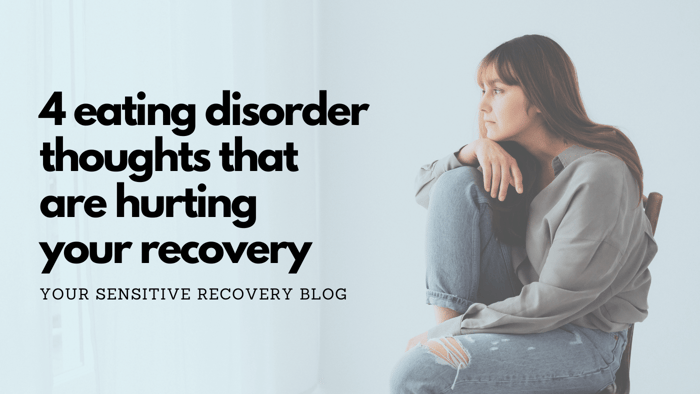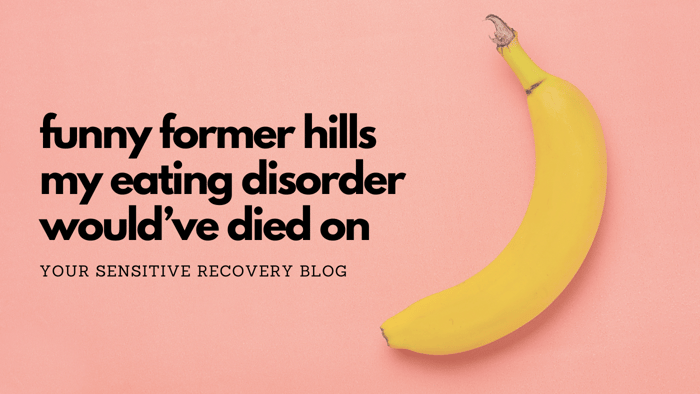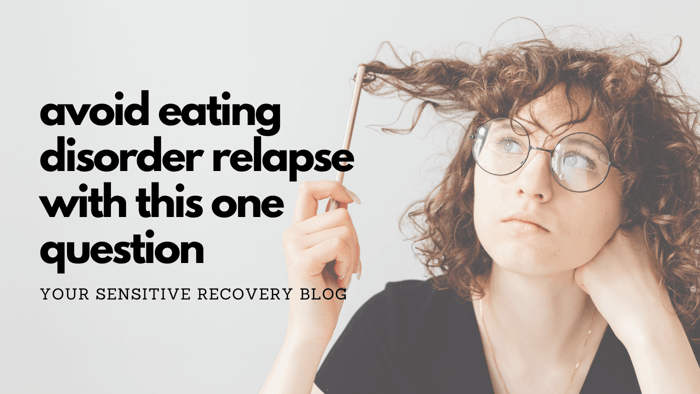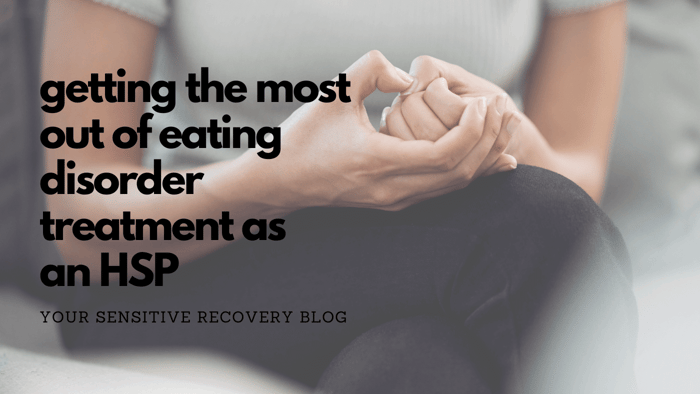Navigating the road to recovery from an eating disorder is not for the faint of heart. Aside from the daily behavioral challenges you have to face, it seems just around every corner there's an insidious, self-sabotaging thought that can threaten your progress and hinder your healing.
In this post, I'm shedding light on 4 common, recovery-sabotaging thoughts, what they really mean, and how to respond to them.
It's not always enough to simply dismiss disordered thoughts when we notice them. They're often a sign that there is something beneath the surface that needs our attention.
We all have multiple parts of ourselves that are vying for attention, sharing their needs and concerns, and viewing life solely through their own very specific lenses. Think about the internal characters in Disney's Inside Out; it's a perfect illustration of this concept. This is why we can continue down paths that we KNOW are not best for us - another part of us is in the driver's seat and is very much convinced that we don't have any other options. All of these parts, with their own unique levels of knowledge and experience, are always trying their best to take care of us.
By recognizing the messages beneath self-sabotaging thoughts and understanding the needs and desires of the Eating Disorder part, we can take back the reins and empower the true Self who can and will ultimately guide our healing.
By the way, I tend not to experience critical thoughts in the first person. Supportive, positive thoughts are almost always in the first person, but not critical ones. I've often wondered if this is the case for other people. For this post, I'm writing out the thoughts in the second person, the way I used to "hear" them.
"If you don't do recovery perfectly, it's not going to stick."
Ahh perfectionism. You probably already know how perfectionism is a risk factor for the development of an eating disorder. It's also a common trait for Highly Sensitive People! If there was one thing that would sabotage recovery, it would be this: trying to do it perfectly.
Because you just can't. Nor should you try, because your slipups and your lapses are EXACTLY what you need to experience to understand where you need to shift your mindset, change up your coping tools, garner support, and more.
➡️ The Message & The Need
Underlying this thought is almost always a fear of failure. Perfectionism is, after all, a tactic meant to protect us from potential harm. If you've associated failure or mistakes with harm in the past (as many of us have), perfectionism swoops in thinking it has the solution! The Eating Disorder part needs reassurance that failure is not final and that mistakes are an essential part of growth.
➡️ A Loving Response
"I know how scary it is to risk failing. We've been hurt and rejected in the past when we've made mistakes. But I know now just how important mistakes are for my recovery, and I'm going to embrace them, and us, through this process."
"Your therapist is going to be mad at you if you're honest."
Hear this. Are you listening? A good therapist will not take your eating disorder behaviors personally. Trust me. As much as we root for you and hold REAL hope for you, we are not invested in your recovery in the same way that your loved ones may be. We are trained and capable of holding space for you whether or not you're doing well in recovery.
➡️ The Message & The Need
Typically, it's shame that lies beneath the reluctance to be honest. When you're in the deepest, darkest depths of an eating disorder, you experience shame for engaging in behaviors and shame for not engaging in behaviors. It honestly feels like a no-win situation. You're so used to at least one part of yourself being disappointed and upset, not to mention potentially your real-life supporters too, who are frightened by your struggles. The Eating Disorder part needs to know that they are in a safe place and deserve support and compassion even when experiencing ambivalence about recovery.
➡️ A Loving Response
"It makes sense why we're feeling ashamed about our ambivalence. Somewhere along the way we've picked up the message that we have to be a certain way to experience love, connection, and validation. But silence and secrecy keep us sick. I will take care of us as we stand together vulnerably in our truth."
"You're not sick enough to get (more) help right now."
If you have ever experienced an eating disorder, you have almost certainly had a thought similar to this one about your deservingness of attention, worry, care, treatment, etc. As I've written about many times before, having this thought is a hallmark sign of a powerful eating disorder.
➡️ The Message & The Need
This thought hints at the way an eating disorder developed as a coping mechanism and the frightening thought of it being taken away. The Eating Disorder part truly doesn't know how to define success outside of sickness and the severity of struggle. It's also an incredibly painful experience to open up about a struggle to someone and have it dismissed or minimized. The Eating Disorder part needs validation that the pain and struggle experienced are valid, no matter what.
➡️ A Loving Response
"I recognize the ways that our pain has been invalidated by others in the past, and how we, ourselves have contributed to that pattern as well. But I will no longer dismiss or ignore our pain. No factor makes our pain less real, less important, or less deserving of compassion and healing."
"If you don't understand why you got sick, you'll never get better."
Oh boy. This one was such a time-suck for me! I didn't know about High Sensitivity during my eating disorder or my recovery from it. I didn't understand how my temperament put me at risk and I didn't identify with the more prevalent theories of the time as to why I suddenly began self-destructing.
➡️ The Message & The Need
This thought is commonly a product of two things: the immense confusion that someone experiences when what is considered a most basic act, nourishing oneself, becomes so very complicated, and, from the top-down therapy approaches that focus heavily on managing symptoms via thought awareness and shifting. Now I 100% support cognition work - our thoughts are extremely powerful after all, but it's just our thinking that's sick. The Eating Disorder part needs hope and assurance that positive change can occur even when things don't make sense.
➡️ A Loving Response
"It's ok to be confused. We have spent a lot of energy trying to figure out the WHY of our eating disorder - and that's all well and good, but we're not going to forget to shift some of that energy toward the HOW of healing. We can still experience a full recovery without a clear understanding of why we got sick. If that clarity does eventually come to us, it will be in good time."
Try It Out For Yourself
The next time you recognize an Eating Disorder thought, take a moment to shift the lens. Practice holding space for the thought with patience, compassion, and curiosity. Is there a need you can meet or at the very least, one you can understand and validate?
Cutting off the parts of ourselves that we don't like is not what healing is about. We must learn to integrate these parts so they no longer feel the need to run the show. By actively working to understand and lovingly respond to these harmful thoughts, we can create space for self-compassion, true resilience, and deep healing.
Remember that each step you take, no matter how small, is a victory.
✨ Josie Munroe, LMFT is a licensed therapist and owner of JosieMunroe.com and Your Sensitive Recovery As a recovered clinician and Highly Sensitive Person, she loves supporting others on their journeys to form new, empowered relationships with food, their bodies, and their sensitivity. Join the newsletter for a weekly boost of hope and inspiration. You deserve a recovery that works for you! ✨





